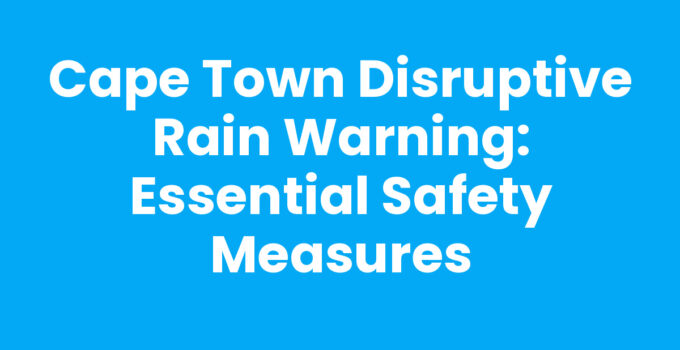Cape Town is known for its stunning landscapes and vibrant culture, but it also experiences unpredictable weather patterns, particularly disruptive rainfall. With climate change causing more severe and erratic weather events, it is essential for residents and visitors alike to stay prepared. In this blog post, we will explore the implications of the Cape Town Disruptive Rain Warning and offer essential tips for safety.
Cape Town Disruptive Rain Warning: Essential Safety Measures
The Cape Town Disruptive Rain Warning indicates a forecast of heavy rainfall that can lead to localized flooding, mudslides, and other hazardous conditions. Here’s a comprehensive guide to ensure your safety during these weather events:
Step 1: Stay Informed
Monitor local news updates and weather forecasts to stay informed about the developing conditions. The South African Weather Service typically provides alerts that can help you stay one step ahead.
Step 2: Prepare Your Home
- Clean Gutters and Drains: Ensure that all gutters, downspouts, and drains are clear of debris.
- Inspect Windows and Doors: Ensure that all windows and doors are properly sealed to prevent water intrusion.
- Move Valuables to Higher Ground: If you live in a low-lying area, consider relocating valuables to upper floors.
- Stock Emergency Supplies: Assemble a kit that includes flashlights, batteries, first-aid supplies, food, and water.
Step 3: Develop a Communication Plan
Establish a communication plan with family and neighbors. Make sure everyone knows how to reach one another in case of an emergency. Designate a safe meeting point in case you need to evacuate.
Step 4: Assess Travel Needs
Before hitting the road, check the status of your route. Avoid traveling during severe weather unless absolutely necessary. If you must travel, familiarize yourself with alternative routes to bypass potential flooding.
Related Guide: Discover the Beauty of Rhodes Memorial Cape Town: A Must-Visit
Understanding the Impact of Disruptive Rain in Cape Town
Disruptive rain can lead to a myriad of issues within the Cape Town area, including:
- Flooding: Heavy rainfall can overwhelm drainage systems, leading to flash floods in vulnerable areas.
- Road Hazards: Roads can become impassable due to flooding or debris, posing dangers for drivers.
- Landslides: Particularly in steep areas, heavy rain can trigger landslides.
- Safety Risks: Increased risk of accidents and emergencies calls for heightened caution.
Being aware of these possible impacts can help residents and visitors take preemptive measures to protect themselves and their property.
Long-Term Preparation: Building Resilience Against Future Rainfall
In addition to immediate safety measures, consider proactive approaches for long-term resilience:
- Invest in Proper Drainage: Consult with professionals to design proper drainage systems on your property.
- Landscape Wisely: Choose native plants and trees that can withstand heavy rainfall and help absorb excess water.
- Community Engagement: Participate in local community programs focused on disaster preparedness and climate resilience.
- Emergency Kits: Regularly update your emergency kits to ensure they meet your family’s needs.
This proactive approach will not just help you in times of adverse weather but also contribute to the overall resilience of the community.
Related Guide: Indulge in the Best Buffet Breakfast Cape Town Has to Offer
Conclusion
The Cape Town Disruptive Rain Warning is a call to action for all residents and visitors. By following the essential safety measures outlined above, you not only protect yourself but also contribute to the resilience of your community. Stay informed, stay prepared, and prioritize safety during these unpredictable weather events.
Related Guide: Discover Burgundy Estate Cape Town: A Hidden Gem Awaits
Frequently Asked Questions
What does a Disruptive Rain Warning mean?
A Disruptive Rain Warning indicates forecasted weather conditions that can lead to heavy rain, causing flooding and impairing daily activities.
How can I prepare my home for disruptive rain?
To prepare your home, ensure proper drainage, seal windows and doors, and relocate valuables to higher ground.
What should I do if I encounter heavy rain while driving?
If you encounter heavy rain while driving, slow down, remain vigilant for road hazards, and seek higher ground if flooding occurs.



